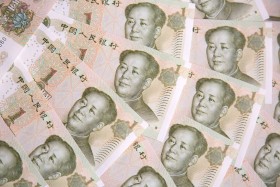
The Chinese yuan is strengthening against many of its currency competitors to start the trading week. But while some economic data are boosting the currency on Monday, reports that investors are pouring into the stock market at the state mediaâs direction is generating all the buzz.
China Securities Journal, a state-owned publication, published a front-page editorial in which it encouraged everyone to buy stocks. According to the opinion piece, investors were told to be prepared for the âwealth effect of the capital markets,â as well as the prospect for a âhealthy bull market.â
Investors ostensibly bought the narrative of the article, contributing to the so-called Melt Up Monday. After it was published, Shanghai stocks rallied 5.7%, the CSI 300 index of Shanghai and Shenzhen-listed shares surged 6% to a five-year high, and Hong Kong stocks advanced by nearly 4%. This comes a week after the Shanghai Composite Index gained close to 6%.
Beijing did something similar in 2015 when authorities and the state-run media encouraged the public to dive into the stock market. It did offer a short-term boost, but the sentiment eventually turned sour when the broader market crashed.
Mark Williams, the chief Asia economist at Capital Economics, told CNBC:
Thereâs quite a long history of policymakers using the media to drive up the market. It doesnât always end very well. We saw that back in 2015, exactly the same statements then. They tried to push the market higher. It worked for a while and then the market collapsed.
Right now, itâs rational for investors to jump into the market because policy makers are telling them the market will go up and it probably will for awhile.
Also, on Monday, the Peopleâs Bank of China (PBoC) skipped open market operations via reverse repurchasing agreements, despite more than $25 billion of reverse repos maturing on Monday. The PBoC said in a statement that liquidity in the banking remained relatively high so that the system could withstand any effects of maturing reverse repo contracts and banksâ deposit reserves.
On the data front, the central bank reported that overall loan demand increased to 75.8 in the second quarter, up from 66 in the first quarter. The data highlighted that the infrastructure and manufacturing sectors accounted for much of the demand for credit support in the April-to-June period. The numbers also pointed to businesses recording improving profitability levels.
The Caixin services purchasing managersâ index (PMI) jumped to 58.4 in June, up from 55.0 in May â anything above 50 indicates expansion. The composite PMI edged up to 55.7 last month, up from 54.5 in the previous month.
This week, inflation and foreign exchange reserves figures will be released.
The USD/CNY currency pair fell 0.67% to 7.0188, from an opening of 7.0664, at 16:33 GMT on Monday. The EUR/CNY slipped 0.13% to 7.9372, from an opening of 7.9493.
If you have any questions, comments, or opinions regarding the Chinese Yuan, feel free to post them using the commentary form below.